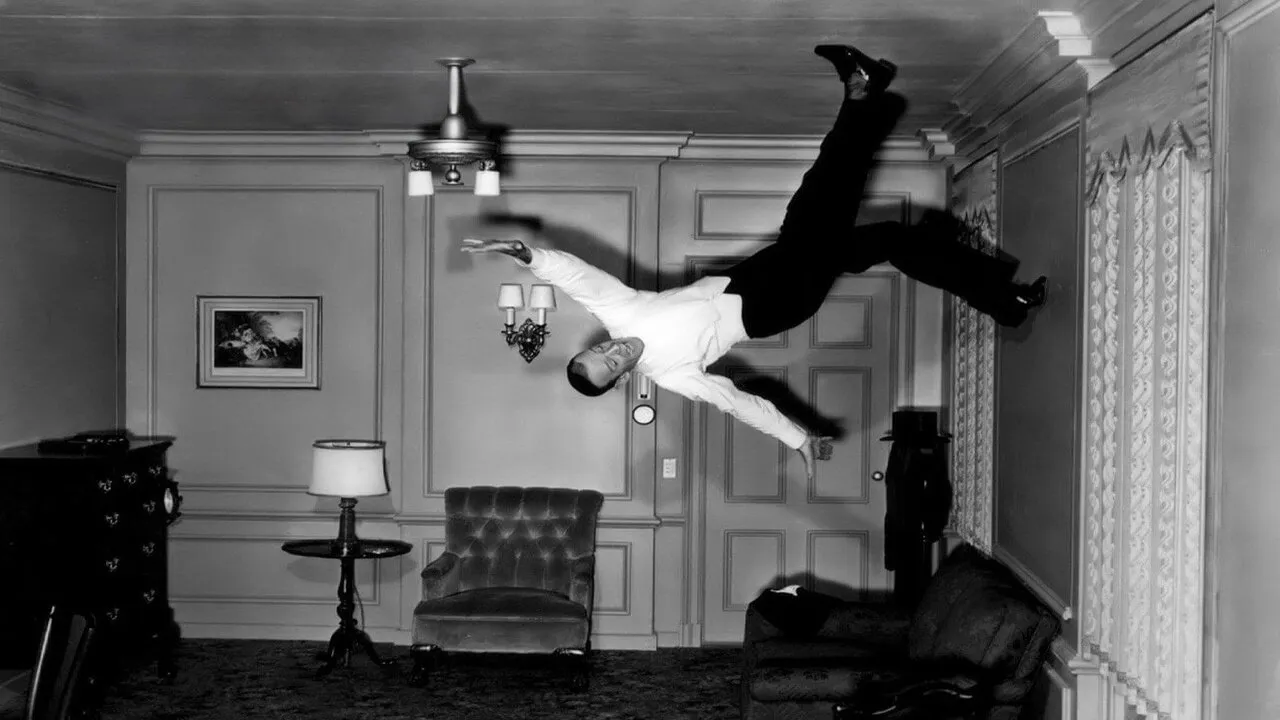While being upside can potentially be deadly, it probably comes as a shock to no one that hanging upside down once and a while can also result in a few benefits. Imagine what dancing upside down could do for one's system. Indeed, this is the most famous moment in Royal Wedding, the 1951 comedy-musical starring Fred Astaire. The scene, in which his character is total bliss (as likely was an adoring early-Fifties audience), escalates with each beat until he's literally dancing on the ceiling. It's unlike anything ever seen in cinema.
How did they create such a feat? It may be better to be gleefully ignorant of how they pulled it off, but if one is still searching for an answering, one can find it from the good folks at bigfott.com. Calling the achievement "an enormous feat of engineering," the website details how everything on set was bolted down as it literally rotated, allowing Astaire to remain upright and (with additional help from his neat choices to make it seem like he was fighting gravity) make it look like he's on the ceiling. (The website's author even created a YouTube video to try and show what this would have looked like on set.) It's pure movie magic.
Now, here comes the bad news: Royal Wedding is a fine example of the converseness of so many motion pictures. On the one way, most of the musical numbers in this film leave a bit to be desired; on the other hand, Astaire makes all of this stuff look like a piece of cake, and he's easily the best part of the film. He's charming and quick-witted throughout most of the film. (His best line is when his character is told that married men live longer than bachelors, to which he responds that "they're only trying to outlive wives so they can be bachelors again.") Obviously, however, he's not the only member of the cast, and none of their lines are as fun, and there are a few shaky English accents sprinkled about, as well. The song Astaire dances to is called "You're All the World to Me," which is probably the film's best. The final theatrical number, called "I Left My Hat in Haiti," is similarly entertaining. Most of the others are not memorable, especially "Too Late Now," a love ballad that comes and goes just in time for you to forget you heard it.
If you're a fan of Astaire's dancing, you'll be satisfied, naturally. Even without the famous ceiling bit, he twirls around a coatrack in one scene and dances around the ship's deck in another during a maelstrom. Of course he dances a lot, because he's a dancer in the film. Astaire plays Tom Bowen, one half of a famous brother-sister theater duo. The other half is Jane Powell, who plays Ellen Bowen. Their hit Broadway show, Every Night at Seven, is such a success that they take it on the road to England, just in time for the royal wedding of Princess Elizabeth and Philip Mountbatten in London.
Once the pair actually reach England, the film's pacing issues are exposed. By this point, Ellen has fallen head over heels for a man named Lord John Brindale (played by Peter Lawford), whom she met on the boat. It takes Tom a bit longer, because he's not the settling-down kind of guy, but he eventually sets his sight on a woman named Anne (played by Sarah Churchill, the daughter of Winston Churchill). She refuses his advances initially, but luckily enough for both of them, she ends up auditioning for him for the London production, and it's love at (sort of) first sight.
As previous mentioned, the film is paradoxical: including just the Astaire numbers make it a masterpiece, but the hour-plus of additional slog firmly plants Royal Wedding in banal mediocrity. It enthusiastically clutches its remarkably low, almost non-existent stakes and hopes its audience does not mind. Believe it or not, dancing on a ceiling can only take a film so far, and (magical or not) it's disappointing that director Stanley Donen and his team were not willing to give the crowds much else to root for. Royal Wedding sort of aims high, but it ultimately is a film that thinks it's like Paris in April and May but is rather Paris in November and December—not atrocious, but not nearly as good as it could be.

